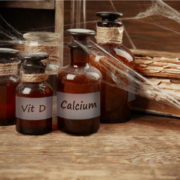Research Update on Vitamin D
Vitamin D supplementation always seems to be in the health news; one day it’s beneficial, the next not so much. One of the problems is that many studies are observational studies. They take a large group of subjects, such as the Nurses Health Study, use food frequency questionnaires to assess vitamin D intake, and report on bone health and other outcomes over time. That has serious limitations in my opinion, not least among them the reliance on food frequency questionnaires, which have been proven inaccurate. Do you remember what you had for dinner last week or the week before? Neither do I.
In a recently published study, researchers did a meta-analysis on vitamin D in observational studies, randomized controlled trials (RCT) on vitamin D supplementation alone, and RCT on vitamin D plus calcium supplementation. The outcomes were all fractures and hip fractures, and the subjects were mostly older than 65.
While there were issues in just about every observational and RCT of some sort, the analysis of each type of trial combined was that vitamin D supplementation did not have a significant effect on the rate of fractures. However, when vitamin D supplementation was combined with vitamin D and calcium supplementation, there was a 6% decrease in all fractures and a 16% decrease in hip fractures over an average of six years. The amounts of vitamin D used were 400 to 800 IU and 1000 to 1200 mg of calcium per day.
While there’s more research to go including the completion of some of randomized controlled trials used in the analysis, take vitamin D and calcium together to reduce the risk of hip fractures and other broken bones. Better together seems to be more effective than overdoing it on a single nutrient.
What are you prepared to do today?
Dr. Chet
Reference: JAMA Network Open. 2019;2(12):e1917789.









